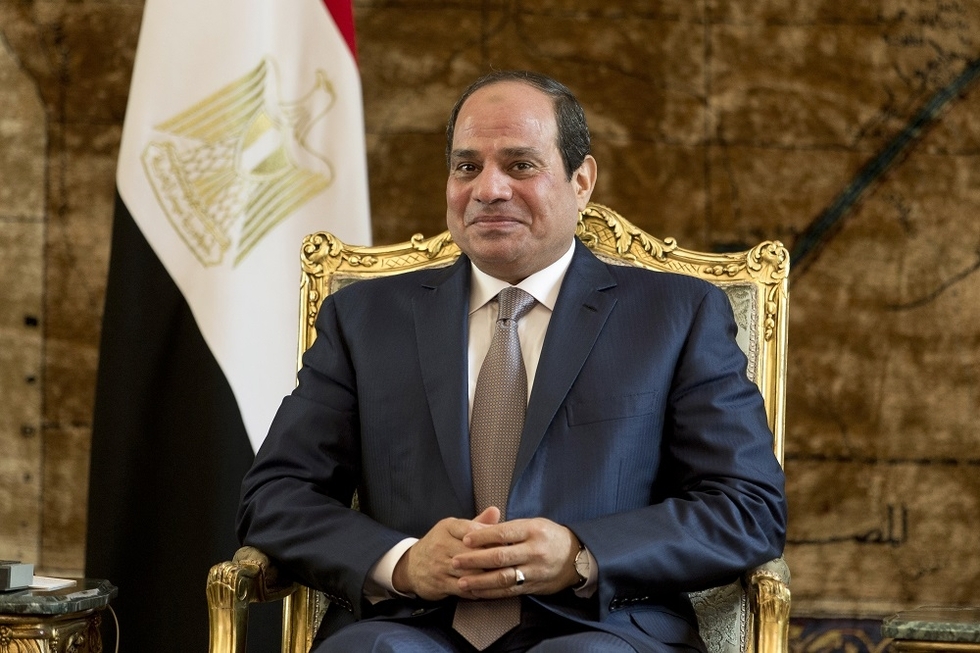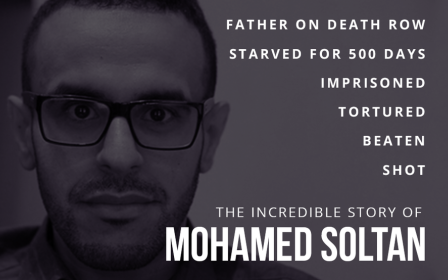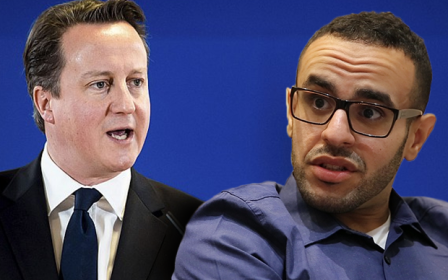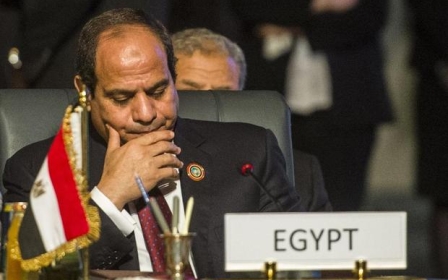EXCLUSIVE: Egypt's Sisi to visit UK at the start of November

Egyptian President Abdel Fattah al-Sisi will visit Britain at the start of November, Middle East Eye can reveal.
The Foreign and Commonwealth Office confirmed on Tuesday evening that Sisi will come to the UK for a visit after receiving an official invitation from the British government. Once here, he is expected to meet with Prime Minister David Cameron.
The FCO would not confirm an exact date for Sisi’s arrival but said that it would take place during the first week of November.
The invitation for bilateral talks was originally extended by Cameron back in June. His team said that the PM would raise "matters of concern" during the visit, although the meeting failed to materialise, possibly due to worries raised by human rights groups, lawyers and activists.
In July, 44 British MPs also signed an early day motion calling on the government not to invite Sisi.
The motion noted “that this House is dismayed that the Prime Minister has extended an official invitation to Egyptian President Abdel Fattah el-Sisi to visit the UK".
In an exclusive interview with MEE this week, Mohamed Soltan, an Egyptian-American dual citizen also criticised Cameron for allowing the visit.
“The Egyptian people deserve better. And I hope that you will demand the upholding of these [democratic] values,” he said.
“It would be a shame for the developed world, some of the strongest governments in the world, to remain silent and turn a blind eye to such glaring violations of international laws and conventions.”
Soltan was imprisoned in 2013 and later staged an almost 500-day hunger strike against his treatment in an Egyptian jail before being released this summer following US diplomatic pressure.
He was one of the media spokespeople for the camp in Cairo’s Rabaa Square, where Human Rights Watch believes at least 817 people were killed, following a brutal crackdown by authorities in August 2013.
Since the Sisi-led military coup on 3 July 2013 that removed elected former president Mohammed Morsi, a member of the now outlawed Muslim Brotherhood, 40,000 largely political prisoners have been arrested and hundreds more sentenced to death in highly controversial mass trials. The Egyptian authorities deny that human rights have suffered in the country since 2013.
At the time of the coup, Cameron said that the violence was "not going to solve anything. What is required in Egypt is a genuine transition to a genuine new democracy”.
The UK government has also said it is “deeply concerned” about Egypt’s decision to sentence Morsi, along with more than 100 Muslim Brotherhood leaders, to death.
“We look to the Egyptian authorities to apply the rule of law consistently in line with international standards, and to protect the political and legal rights of all Egyptians as the basis for the country’s future stability,” Tobias Ellwood, Britain's minster for the Middle East and North Africa, said in May.
However, relations between Cairo and London have warmed this year.
In March, UK Foreign Secretary Philip Hammond led a “strong” British delegation to an international conference in Sharm el-Sheikh, aimed at attracting foreign contracts and investment.
According to the Foreign Office, Britain is the largest single investor in Egypt and makes up almost 50 percent of all foreign direct investment. A string of British companies including British Gas, Vodafone, and WH Smith have strong working relations with Egypt.
“Britain’s commitment is not just about three days in Sharm el-Sheikh, but about having a permanent presence at the heart of Egypt’s economy,” UK’s Ambassador to Egypt John Casson said at the time.
Despite human rights concerns, Sisi travelled to Germany back in June, controversially bringing 140 high-profile supporters in an apparent attempt to highlight his popularity. He also visited France in November 2014 and has since signed a series of high-profile arms deals with Paris.
Cameron's Conservative Party declined to comment for the piece. The opposition Labour Party also did not respond to requests for comment although UK’s opposition leader, Jeremy Corbyn has previously spoken out against receiving Sisi in the UK.
"I would not have invited [Sisi] to the UK because of my concerns over the use of the death penalty in Egypt and the treatment of people who were part of the former government of Morsi, which was elected, and the continued imprisonment of President Morsi," he told MEE in August, shortly before his election to the Labour Party leadership.
"That's not to give a judgment on the Brotherhood or any other party – it's to give a judgement on what democracy actually means.”
Earlier this year, when reports of the visit first emerged, Amnesty International called the invitation “appalling”.
The decision is “astonishing and short-sighted,” Middle East and North Africa deputy director Hassiba Hadj Sahraoui said in June.
“There’s been a sharp rise in the number of death sentences and executions since Sisi came to power, some of which have taken place after grossly unfair trials. Thousands have been detained and many languish in jail, including journalists, in an apparent attempt to quash all dissenting voices,” Sahraoui said.
New MEE newsletter: Jerusalem Dispatch
Sign up to get the latest insights and analysis on Israel-Palestine, alongside Turkey Unpacked and other MEE newsletters
Middle East Eye delivers independent and unrivalled coverage and analysis of the Middle East, North Africa and beyond. To learn more about republishing this content and the associated fees, please fill out this form. More about MEE can be found here.




